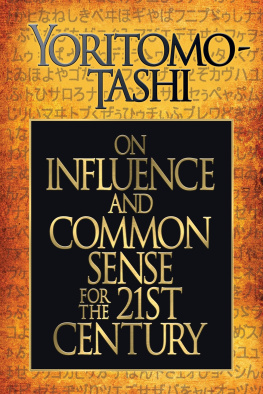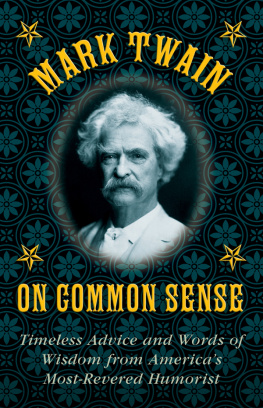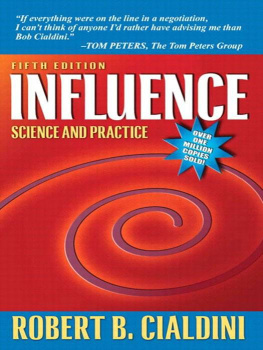
On Influence and Common Sense for the 21st Century
On Influence and Common Sense for the 21st Century
Influence:
How to Exert It
Common Sense:
How to Exercise It
YORITOMO-TASHI


Published 2020 by Gildan Media LLC
aka G&D Media
www.GandDmedia.com
ON INFLUENCE AND COMMON SENSE FOR THE 21ST CENTURY. Copyright JMW Group Inc. All rights exclusively licensed by JMW Group Inc., .
No part of this book may be used, reproduced or transmitted in any manner whatsoever, by any means (electronic, photocopying, recording, or otherwise), without the prior written permission of the author, except in the case of brief quotations embodied in critical articles and reviews. No liability is assumed with respect to the use of the information contained within. Although every precaution has been taken, the author and publisher assume no liability for errors or omissions. Neither is any liability assumed for damages resulting from the use of the information contained herein.
Front cover design by David Rheinhardt of Pyrographx
Interior design by Meghan Day Healey of Story Horse, LLC
Library of Congress Cataloging-in-Publication Data is available upon request
ISBN: 978-1-7225-0336-9
eISBN: 978-1-7225-2441-8
10987654321
CONTENTS
Influence:
How to Exert It
Common Sense:
How to Exercise It
BOOK 1
Influence:
How to Exert It
Contents
by Arthur R. Pell
Foreword to Original Edition
Y oritomo-Tashi, whose precepts are presented in this book, ranks as one of the three greatest statesmen that Japan has ever produced. He was her most illustrious and wise Shogun, and, as founder of the first Japanese dynasty of Shoguns, the reviser of the Empires code of laws, and the organizer of military feudalism, he rescued his native land from the slough of demoralization into which it had sunk. In 1186 he established the seat of his government at Kamakura, where he organized an administrative body similar in its methods and operation to the metropolitan government. From what is known of his public career, it is evident that the great Shogun exercised a dominant influence over the minds of his people. To him the art of influencing others was the key to Success. The great philosopher believed that the spirit of the individual continuously exerts influence, even as the flower also exerts influence by spreading its fragrance in the air. But just as the blossom cannot tell whither its fragrance spreads, so none of us can say how far our influence may reach. To an anonymous writer we owe the thought that Influence never dies. Every act, emotion, look, and word make it felt for good or evil, happiness or misery.
In the twelve lessons that Mr. B. Dangennes has drawn from the writings of Yoritomo-Tashi, and presents in this book, the manner in which Influence may be exerted and the means by which it may be exercised are considered. One lesson is devoted to the increase and expansion of psychic forces to awaken the dormant energies within us; another explains how influence may be exerted by persuasion and suggestion; a third shows the value of the fixed idea when supported by logical arguments; a fourth treats of the magnetic influence of the human eye and provides exercises for its development; a fifth deals with the power of good example; a sixth points to value of perseverance the achievement of great things by the utilization of spare moments; a seventh emphasizes the power of concentration, and provides exercises for its acquisition, and an eighth shows that by exchanging confidence one may exert a mighty influence that can benefit even those suffering from mental and physical ailments. Confidence, says Yoritomo, is the foundation of courage and the mainspring of action. How much our own Emerson believed in this aphorism he has told usTrust people and they will be true to you; treat them greatly and they will show themselves great. To confide in another, even though one be betrayed, is better than to conceal. Those who suspect evil are seeking in their neighbor for the very thing that they see in themselves, while those who exert a useful influence are people of strength and initiative who consecrate their energies to the achievement of that which is good.
Throughout the following pages the editor has provided suggestions, examples, and exercises as aids to the reader in the acquisition of this, the desirable art of knowing how to influence others in the world at large.
Introduction
by B. Dangennes, Editor of Original Edition
T he success that has attended the publication of Timidity Overcome, an earlier work by Yoritomo-Tashi, has encouraged me to print the precepts he developed on his methods of exerting influence.
The public can learn much from the old Shogun, whose doctrine, ringing with truth, is as applicable to the needs of our own day as in the time when it was first revealed.
Moreover, it is embellished with legends, gentle or austere, which suggest the sight of a smooth, grassy slope on which appear, here and there, scattered among rough oak trees, the rarest and most exquisite flowers.
Thus, it is with a deep and serious joy that I have again opened the manuscripts to transcribe in our own beautiful language the precepts and reflections of him who was at once a leader of men and a spiritual guide.
Again, little by little, I feel myself swayed by the charm already experienced; and the influence of these words, which seem to spring from the very beginning of time, and to have been diffused throughout the world, attract me and enthrall me with the doctrines of his philosophy in ever-increasing admiration.
Influence! that almost magical word, what things it suggests!
To influence others! What a marvelous gift, and what assured success to those of us that possess it!
We will know only by name the torments born of antipathy and of the loneliness of self-isolation from the rest of humankind.
The weaknesses of the will, the terrors that cause the rise of the phantom of agonizing doubt, will be strangers to us.
Both the spirit and the body will be under our command.
The griefs of life never will completely overwhelm us, for, having foreseen them, we will know how to mitigate them.
We will have the joy of seeing that peoples hearts, under the influence of our word and example, will open to pure and noble sentiments.
The art of succeeding will become familiar to us, for we will know how to attract to ourselves voluntary collaborators.
In short, our power will set us apart as a being different from others, and, to use an ancient Japanese saying, filled with dominating power: We will build our palaces on the bones of the timorous.
Next page














